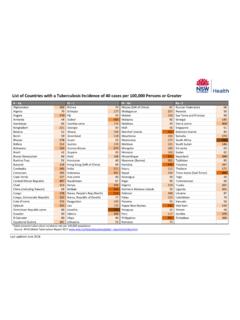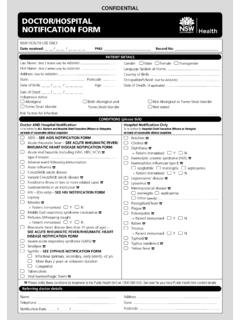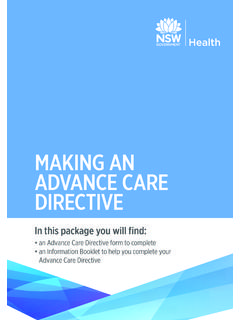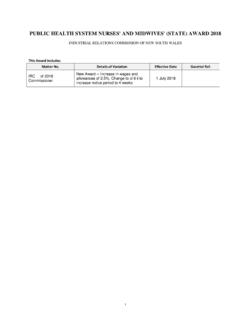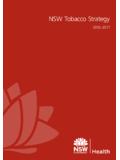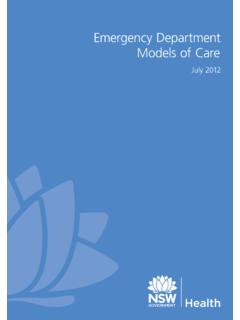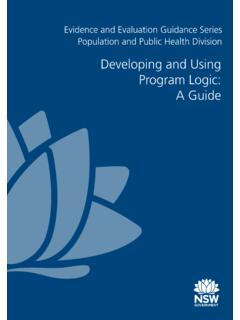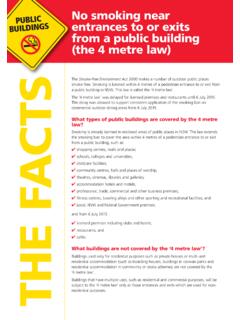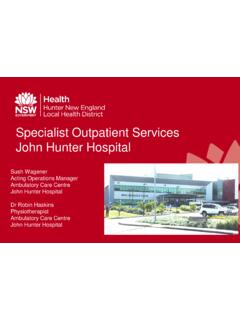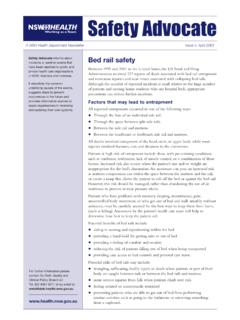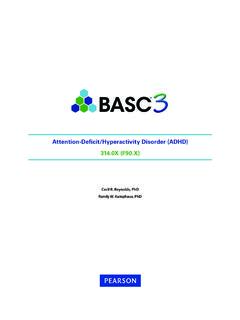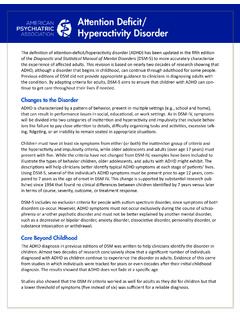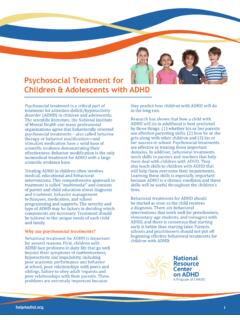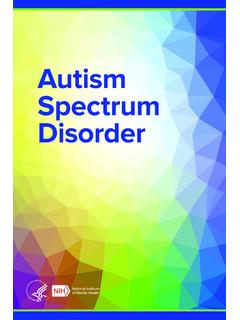Transcription of CRITERIA FOR DIAGNOSIS AND MANAGEMENT OF …
1 CRITERIA FOR DIAGNOSIS AND MANAGEMENT OF attention deficit hyperactivity DISORDER IN ADULTS For the purpose of this document adults are considered to be persons who are 18 years or over. Separate CRITERIA have been developed for the MANAGEMENT of ADHD in children and adolescents (TG 181). DIAGNOSIS of ADHD does not imply that psychostimulant (dexamphetamine, methylphenidate and lisdexamfetamine) medication must be used. Prior to considering the use of psychostimulants in the MANAGEMENT of this condition, consideration should be given to other factors in the patient's environment, which might influence the presentation, by obtaining information from a broad range of health professionals such as community health workers, psychologists and others as necessary.
2 Careful consideration should be given on a case-by-case basis to the potential risks and benefits of psychostimulant therapy. Psychostimulant medication may be an effective part of the MANAGEMENT of ADHD in some adults. In New South Wales, it is a legal requirement that psychostimulants may generally be prescribed only with the prior authority of the NSW Ministry of Health. However, psychostimulants may be prescribed, without prior authority of the NSW Ministry of Health, by authorised medical practitioners as outlined on page 3. It is important for the prescriber to ensure that potential cases of adult ADHD are selected and assessed appropriately, and that prescribing of psychostimulant drugs is monitored and the therapeutic response adequately assessed on follow up.
3 Individual differences in responses by patients to these medications and consequential dosage requirements need to be recognised. The prescriber should try to achieve comprehensive MANAGEMENT of the patient's and the family's difficulties including the development, documentation and implementation of a treatment MANAGEMENT plan. Where psychostimulant medication is recommended, the patient s informed consent should be obtained. This includes informing the patient of the nature of the treatment, its likely results and relevant foreseeable side effects of the treatment. 1. ASSESSMENT The assessment of ADHD in adults and initial prescribing of psychostimulants is limited to Psychiatrists.
4 The patient should be reassessed at around 6 months after the commencement of treatment. For this reason authorisation to prescribe for the first six months is confined to the practitioner carrying out the assessment. The following exceptions apply: Where a patient has been treated with psychostimulant medication for ADHD prior to their 18th birthday and there has been a break in treatment of not more than two years, a Neurologist may continue treatment A Paediatrician who has diagnosed and treated a patient for ADHD prior to their 18th birthday may, in extenuating circumstances including an ongoing therapeutic TG190/4 Issue date: March 2015 Page 1 of 5 relationship, continue treatment with psychostimulants until age 25.
5 Provided that MANAGEMENT is in accordance with the CRITERIA and conditions outlined in this document, prescriptions may be endorsed with the CNS number and notified to the Ministry on a monthly basis using the latest version of the notification form provided for this purpose. Otherwise, an individual patient authority is required. 2. CRITERIA FOR DIAGNOSIS The following CRITERIA should be used in conjunction with the DSM-IV CRITERIA : A childhood history characterised by clear-cut hyperactivity and/or attention problems with at least one of the following symptoms/signs: behaviour and/or attention problems at school; impulsivity; over excitability; temper outbursts.
6 The continuing presence in adulthood of hyperactivity and/or inattentiveness together with at least two of the following six characteristics: affective lability; disorganisation and inability to complete tasks; hot temper; impulsivity; easily distracted; major problems with short-term memory. Evidence that the condition is long standing and clinically severe in terms of dysfunction. Symptoms are continuous - not related to stress or crises. Note: Whilst co-morbidity ( depression, anxiety/panic, affective disorder) often exists, ADHD should be the most prominent disorder. 3. MEDICATION Dosage Dosage should be titrated against the patient's need but should generally not exceed 30mg dexamphetamine or 60mg methylphenidate daily in immediate release, or 72mg methylphenidate in controlled release formulations or 70mg lisdexamfetamine.
7 Care should be exercised when psychostimulants are used in combination with other psychoactive substances ( antidepressants may potentiate central and cardiovascular effects). Special Precautions Particular caution should be exercised where the following conditions are present: TG190/4 Issue date: March 2015 Page 2 of 5 - Tics, dyskinesia and history of Tourette's syndrome. - Hypertension and cardiovascular disease. Contraindications - Schizophrenia or other psychoses. 4. GENERALLY AUTHORISED SPECIALST PRESCRIBERS (S28c AUTHORITY) Note: Only a psychiatrist or neurologist may apply for an S28C authority number.
8 A psychiatrist or neurologist who has been issued with a S28c authority number by Pharmaceutical Services Unit of the NSW Ministry of Health may prescribe psychostimulant medication without a prior authority provided that the patient has been diagnosed as suffering from ADHD and satisfies all of the CRITERIA set out under CRITERIA for DIAGNOSIS , the patient has been assessed as set out under Assessment and the patient s condition is being managed generally in accordance with this document. A condition of the S28c authority is that the prescriber must complete and return a notification form of each prescription written on the basis of this authority each month.
9 Psychostimulant return forms should be completed electronically using the template on the PSU website In cases where the CRITERIA are not met or where any of the following exclusions apply, an application for authority to prescribe for an individual patient must be made. Exclusions Authorised specialist prescribers may not use their S28c authority number in the following circumstances - The daily dose prescribed is greater that 30mg dexamphetamine, 72mg methylphenidate, 70mg lisdexamfetamine, or - The patient is aged more than 70 years, or - The patient has a history of schizophrenia or other psychoses, or - the patient suffers diagnosable anxiety, depression or other co-morbid condition requiring treatment in its own right, or - the patient has a history of significant substance abuse or dependency, including past or present treatment for dependency ( methadone, buprenorphine.)
10 Naltrexone, acamprosate, etc.) and intravenous drug use at any time. Note: Past history (but not in the last 3 months) of infrequent, non-parenteral illicit substance (including cannabis) abuse may be considered not significant. TG190/4 Issue date: March 2015 Page 3 of 5 5. APPLICATIONS An application for authority to prescribe for an individual patient must be made where - a medical practitioner does not have an S28c authority issued by the NSW Ministry of Health, or - where the medical practitioner does have an S28c authority and the CRITERIA are not met or any of the above exclusions apply. In these cases, applications for authority to prescribe must be supported in writing by a detailed second opinion from an independent psychiatrist ( from a different practice).
